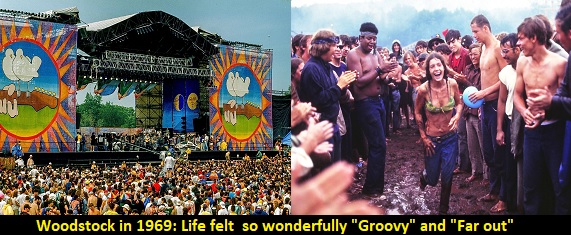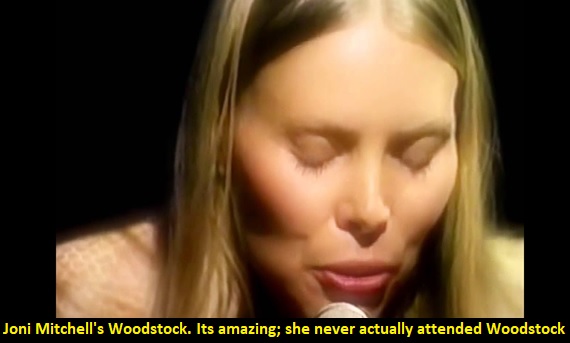Joni Mitchell’s Woodstock. Every time I hear it, this song sends me back to High School and the wonderful times I had there. It takes me back to a time when life seemed “right” and opportunities seemed endless. Take a gentle trip back there with me by clicking on this Youtube link to see and hear Joni as she was in 1970 https://www.youtube.com/watch?v=cRjQCvfcXn0.
Joni’s classic song “Woodstock” stands as a powerful anthem of an era, a testament to the spirit of a generation, yet it carries an amazing curious twist – even though she wrote and performed the song that defined Woodstock to many of us, Joni herself never set foot on the grounds of the historic Woodstock festival. This paradox adds an intriguing layer to both the song and Mitchell’s legacy, highlighting the essence of artistic interpretation and the ability to capture a collective experience beyond personal participation.
In the summer of 1969, half a million people gathered in Bethel, New York, for what would become one of the most legendary music festivals in history. Woodstock was more than just a music event; it was a cultural milestone, a symbol of peace, love, and the counterculture movement of the 1960s. Joni Mitchell, however, was not among the performers or attendees. At the time, she was scheduled to appear on The Dick Cavett Show, a commitment that prevented her from being part of the Woodstock festivities.
Despite missing the event physically, Mitchell’s song “Woodstock” remains an enduring tribute to the spirit of the festival and the era it represented. Written shortly after the festival took place, Mitchell penned the song based on the firsthand accounts of her then-boyfriend, Graham Nash, who performed at the event with Crosby, Stills, Nash & Young. Through Nash’s vivid descriptions and her own reflections on the tumultuous times, Mitchell crafted a masterpiece that would become synonymous with the Woodstock experience.
“Woodstock” is not merely a song about a music festival; it is a reflection on the aspirations and ideals of a generation. Mitchell’s lyrics capture the essence of the event’s ethos, invoking images of “we are stardust, we are golden” and the yearning for a place “where we can be.” The song’s chorus, with its iconic line “And we’ve got to get ourselves back to the garden,” encapsulates the desire for a return to simplicity, unity, and harmony with nature—a sentiment that resonated deeply with the Woodstock attendees and the broader counterculture movement.
What makes Mitchell’s songwriting so poignant in this context is her ability to transcend the specific event of Woodstock and tap into the universal longing for connection and meaning. While she may not have been present at the festival physically, her song captures its essence emotionally and spiritually. It becomes a symbol not just of Woodstock itself, but of the entire era—a time of upheaval, hope, and the search for a better world.
In a way, Mitchell’s absence from Woodstock allows her song to serve as a bridge between the event and the broader human experience. By not being confined to the specifics of one weekend in August 1969, “Woodstock” becomes a timeless anthem for anyone who has ever felt the pull of something greater, the desire for peace, and the yearning for a more harmonious existence.
Joni Mitchell’s “Woodstock” stands as a testament to the power of art to transcend physical limitations and capture the essence of a moment. Her ability to craft such a profound and enduring song about an event she never attended speaks to her genius as a songwriter and her deep understanding of the human condition. As we continue to revisit the music and messages of the 1960s, “Woodstock” remains a shining example of how one artist’s interpretation can come to symbolize an entire generation’s hopes and dreams.


